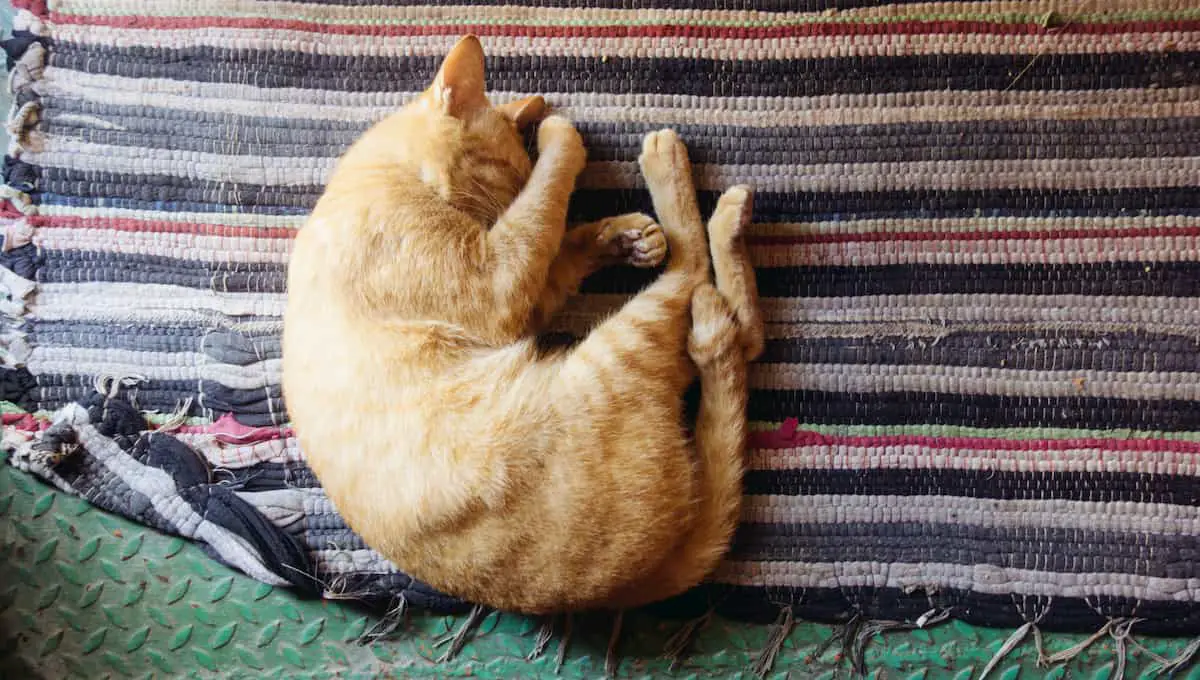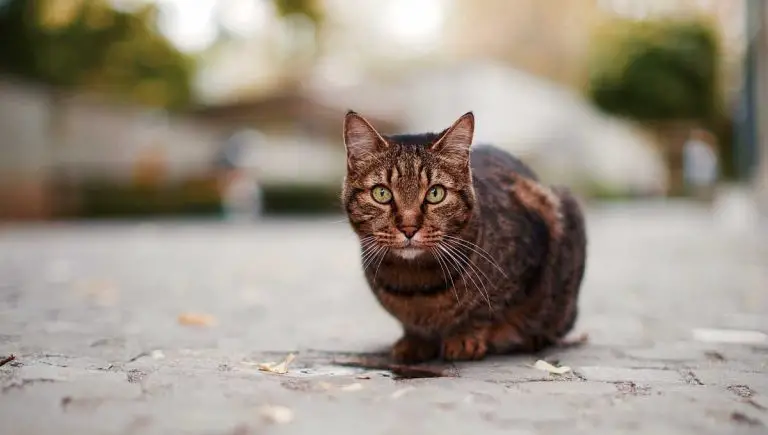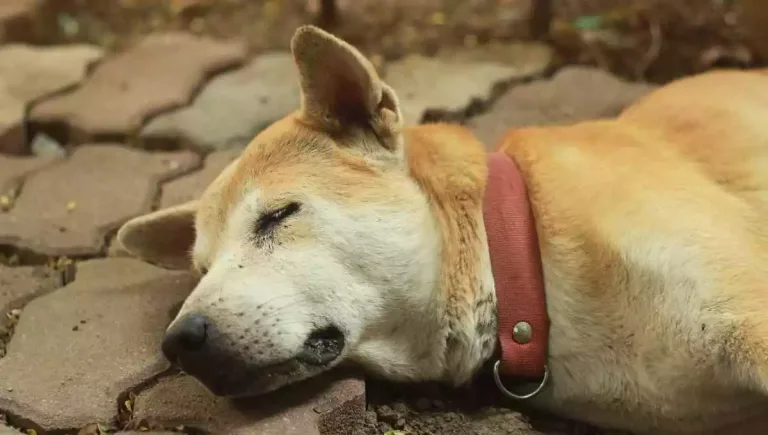How Long Can You Keep a Dead Cat Before Burial?

Dealing with the death of a pet can be emotionally draining. If you have a cat who you consider to be a member of the family or best friend, it can be devastating to think about saying goodbye. Disposing of a cat is hard to do, but unfortunately it’s a necessary step to take. If you’re going through the loss a cat, you might be wondering “how long can you keep a dead cat before burial?”
The length of time that you can keep a dead cat will depend completely on how you store the cat, as well as the temperature of the room it’s kept in. It could take a full day or two before the smell of the cat’s body beginning to decompose becomes noticeable.
Some owners will hold on longer to their pet cat’s remains because it’s hard for them to let go. Others simply need to wait for other family members to be with them if a funeral is to be held for the cat. Whatever the reason for not disposing of the cat immediately, you need to know the proper ways to store it properly to prevent the smell of decay from spreading in your home.
This post contains affiliate links. This means Yard Blogger may earn a commission should you make a purchase using any of our links. Please refer to our full affiliate disclosure policy for full details.
Here’s a Quick Pro Tip!
The best way to preserve your deceased cat before it begins to decompose (rigor mortis sets in immediately after death) is to store the animal’s body in a freezer.
While putting your beloved pet’s body in the freezer will help preserve it, most people aren’t fond of the idea of having a dead animal in the same place they put their food.
Small Chest Freezers like these on Amazon work really well to preserve your pet, while also making sure things stay sanitary.
Chest Freezers take up very little space but are large enough to fit pets of most sizes.
How Long Can You Keep A Dead Cat In The House?
Losing a pet is never easy, and it’s even more heartbreaking if you have kids who will surely be in a lot of grief. While you can always consult your veterinarian for after-care of your beloved cat, you might not know what to do if cat death happens and you’re alone at home.
First off, it’s normal to cry your heart out, especially if you’ve had your cat with you for a long time. But no matter how hard saying goodbye can be, you’ll eventually need to let go. If you plan to keep your cat inside your home, know that sooner or later, you will deal with the smell of a dead animal.
You can keep your pet cat inside the house if you haven’t decided what to do with it. However, this may not be for very long as rigor mortis (post-death stiffness) will soon set in and the horrible smell will start to bother you or everyone in the house. Rigor mortis usually sets in around three to four hours after death and will complete after 12 hours.
How Long Does It Take For A Dead Cat To Decompose?
So you’ve decided that you want to keep your dead cat at home for the time being. “How do I store my dead cat?” you might ask. As mentioned, you need to find a sturdy, sealed container to place your dead cat in.
You also have to think about decomposition, the rate of which will vary according to the following factors:
- Weather – the colder the area, the more delayed the decomposition rate will be. In contrast, in hot and humid areas, this rate will be much faster.
- Size of cat – the bigger the cat, the longer it takes to decompose.
Many pet owners who have experienced pet loss report that it could take two days for the decomposition to be noticeable. For a cat to be almost bones, it could take 10 days and this is with the help of decomposing parasites, beetles, and other insects.
How Long Does It Take For A Dead Cat To Start Smelling?
Usually, the stench of a deceased pet starts in two to three days. Usually, this is the stage when your cat bloats and the body starts to putrefy or smell. That said, you shouldn’t keep your pet inside your home longer than two days, unless you place it in a freezer.
How Long Does It Take For A Dead Cat To Stop Smelling?
You usually don’t have to worry about a dead cat smell if you properly stored your pet. However, if you failed to do so or in cases where you didn’t know that your cat tragically died somewhere in your property, the smell will get to you.
It could take days, weeks, or even months for the odor to linger, depending on the environmental conditions of the area where the dead cat is. This smell will only dissipate if the remains have dried out, which means when your beloved pet is all bones.
How Do I Store My Dead Cat
If you decide that you want to store your deceased cat – because you can’t bear to part with it just yet, or you are still waiting for burial or cremation services, then here are some tips to consider:
- Prepare some cloth and the possibility of a cleanup – pets will expel fecal matter or urine upon death. That said, you need to carefully wrap your pet in a towel or blanket
- It’s better if you position your cat properly before complete rigor mortis sets in
- Proper positioning means tucking their front and hind legs in rather than leaving your pet outstretched. This makes for easy transportation or burial.
- After positioning and wrapping your pet, gently place it inside a heavy-duty bag. Double-bagging is recommended. Try it with Hefty Strong Garbage Bags.
If you need more time to decide what you want to do before disposing of your cat’s body, freezer storage is going to be your best option. This helps preserve the body and prevent decomposition of the cat.
Decomposition starts after death, which is why you need to place your pet in a container and in a cool area. Some owners put their dead pet in a freezer until they know what to do with the body.
If you want to freeze your pet because immediate burial or cremation is not feasible at the moment, then check out our detailed guide on how to store a pet in the freezer safely.
What To Do With A Dead Cat At Home?
If storing your pet for days is not an option, then you need to start with the proper disposal of your beloved cat. There are three popular methods you can use to approach this:
- Burial
- Cremation
- Freezing for taxidermy
Burial
Burying a cat in your backyard is quite a common practice. After all, most pets are treated like family, and owners want to make sure they are given a decent resting place. You have two options if you wish to bury your cat: burying it in your property or in a pet cemetery.
Grieving cat parents usually go for the first option, because it gives them a sense of peace and relief, knowing that their feline friend is just nearby. In addition, it is like sending off someone special that you may feel the need to hold a funeral with people that matter.
While burial at home is a popular method of disposing a beloved pet, you have to realize that there are downsides to it. For one, if you decide to move houses, you can no longer bring your cat’s remains with you.
If you are renting and have a shared backyard, it may seem inappropriate to have to bury your pet. And of course, there’s the concern of facing fines since digging in a residential lot to bury a dead body is not only illegal but it possesses health risks.
According to an article found in The Conversation, backyard burial is not always the best option for pet owners for several reasons outlined below:
- It poses a risk to other pets and wildlife, especially if the beloved cat was put down using high concentrations of an anaesthetic. If a pet or any animal digs up the burial site, they may ingest the drug, which can persist in the dead body for up to a year.
- Disease could spread to other pets and animals nearby, especially if it’s the cause of death of your pet instead of a natural death
In addition to the health risks mentioned above, it is also against the law to bury a pet in your backyard, even if you legally own it. This, however, will depend on the state you live in so it’s best to research your local laws regarding this subject.
Meanwhile, a pet cemetery is the perfect resting place for your beloved cat if a backyard burial is not an option. Ask guidance from your veterinarian if you don’t know any pet cemetery in your area.
Cremation
Cremation can be done in two ways: communal and individual. The first option is usually a free service, in which your cat’s remains will be cremated along with other dead pets. Usually, this method means that the ashes are disposed of properly.
On the other hand, individual cremation means that your cat’s ashes will be returned to you. You can do whatever you want with it. Pet owners usually keep them in a vase or urn and display it in the house.
Taxidermy
Not everyone agrees to the idea of having a pet taxidermied. However, there are pet owners that do want to preserve their pet to visually remind them of their existence. This brings comfort to anyone who lost a beloved pet. They can be costly, too, which is why they’re not really a popular option.
Can You Put A Dead Cat In The Garbage?
If you search, “my cat died, what do I do with the body?” dumping in the garbage is usually not the first and popular answer. However, it happens and some people do it no matter how inappropriate it may sound to a pet owner.
Throwing a dead cat in the garbage is not illegal in many states and counties. In fact, it is a necessary decision for some people, especially those who cannot afford a pet cemetery, cremation, or a burial.
Surely, a lot of people will judge you for it if you do this method, but it really boils down to your available resources. It’s worth knowing that this is not prohibited and mostly there are no laws against it. But just to have some courtesy, you can place your deceased cat in a box and label it and be considerate enough to inform the garbage collector.
Conclusion: How Long Can You Keep a Dead Cat
Keeping a dead cat is a necessary step most pet owners take for several reasons. One is they usually don’t immediately know what to do with their dead pet and the other is that they want to cherish the final moments with them.
Another is when a cat is to be buried and there is a need to wait for other family members to attend the burial. Or perhaps, the pet is stored for taxidermy later on. Whatever the reason you have for keeping a dead cat, for the time being, know that it only takes two days for it to start smelling.
The decomposition rate, however, will still depend on environmental conditions and the size of your cat. To be on the safe side, it’s recommended to dispose of your deceased pet within two days or less. Otherwise, store it in an air-tight container in a cool area, preferably a freezer.







